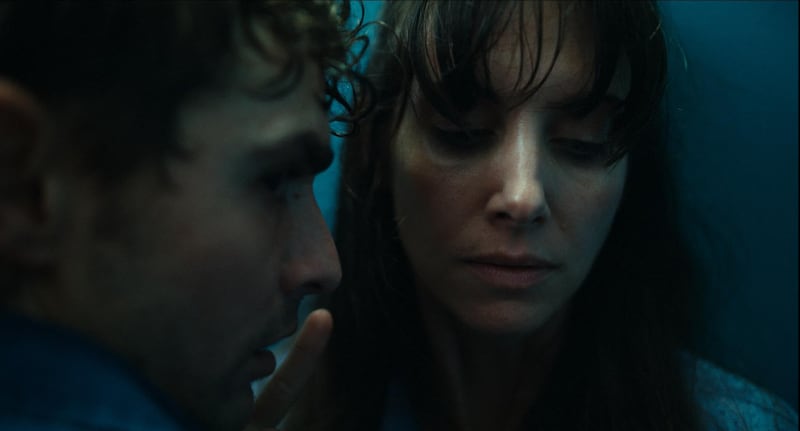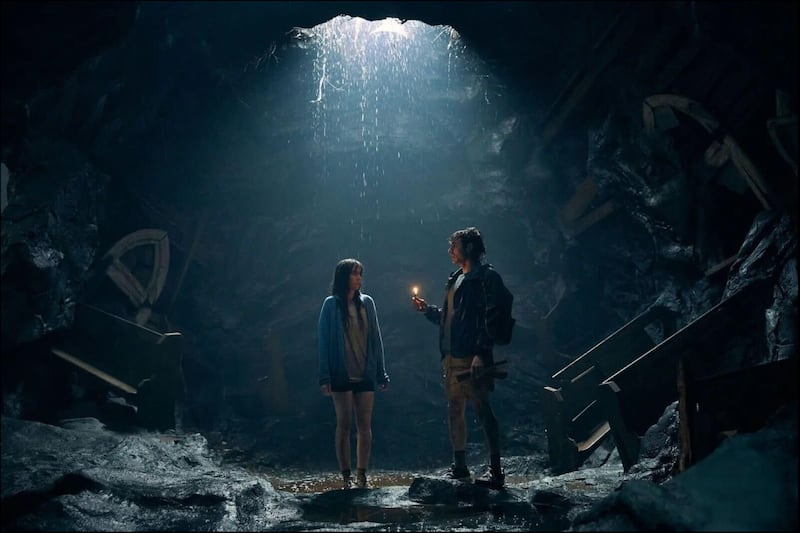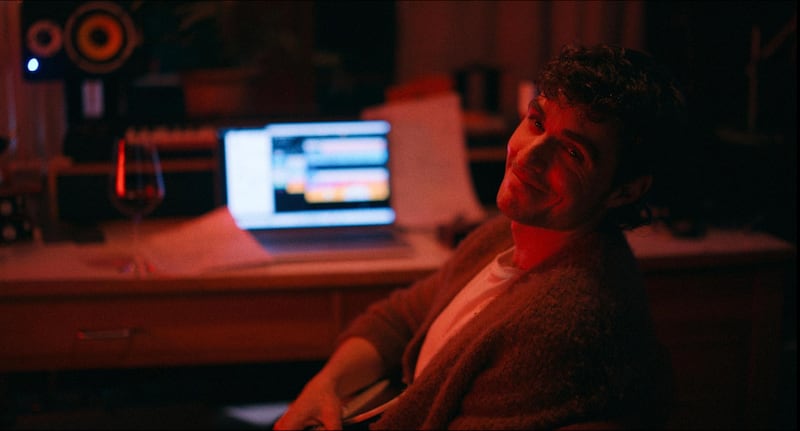Dave Franco and Alison Brie have made the midnight movie of the year.
At January’s Sundance Film Festival, no selection was more raucously received than Together, a body-horror thriller about a relationship that gives new meaning to the term co-dependent.
Written and directed by Michael Shanks (in his feature debut), it tells the tale of a young couple whose move from the city to the countryside is fraught with tensions that are wildly exacerbated by a freak accident that draws them together in the most monstrous fashion imaginable. Indebted to The Thing, The Substance, and the works of David Cronenberg (among others), it’s a film built to provoke squirms, laughs, and gasps, often in rapid succession.
To date, it’s 2025’s most entertaining nightmare.
Shanks’ direction is central to Together’s giddy thrills, but it’s Franco and Brie who make it a gonzo scream. Playing a pair whose growing separation is reversed by their supernatural circumstances, the duo—who are married in real life—mine pre-marital stresses to amusingly uncomfortable effect. Theirs is a rapport strained to the breaking point, and the couple’s bickering takes on a bonkers new dimension once they find themselves irrepressibly drawn to each other.
Together proves that Franco and Brie—whose prior collaborations include the Franco-directed The Rental and Somebody I Used to Know, both of which star Brie—have a natural on-screen chemistry that they’re unafraid to spike with hostile emotions. Furthermore, it’s confirmation that they like to push the outlandish envelope, here epitomized by escalating set pieces involving sticky legs, stickier private parts, and a late bit with an electric saw.

Going to gnarly extremes while keeping things fleet and funny, the unaffected and charming duo make Shankman’s debut a hilariously unhinged portrait of recognizing your true love and staying united through thick and thin. On the eve of its July 30 theatrical premiere, we spoke with Franco and Brie about how their relationship informed their performances, the still-pending lawsuit against the film, and how they’d like to be remembered on social media.
In real life, you’ve been together for years. Would you ever get as close to each other as your characters do by the end of Together?
AB: I mean, we nearly had to in the filming of this movie. Shooting this movie is possibly the most intimate we’ve ever been together [laughs].
DF: On or off screen.
AB: You know, in life, I would probably say no.
DF: As codependent as we probably are in our real lives, we do love our independence, and we wouldn’t want to necessarily be attached to each other in a literal way forever.
At Sundance, Together went over like gangbusters. Was it important to choose a distributor (NEON, ultimately) that would give it a proper theatrical release?
DF: One hundred percent. This is a movie that plays so well with an audience. It’s a movie that people interact with. In these screenings that we’ve been going to, people scream and laugh and shriek and grab their partners.
AB: It’s a whole experience.
DF: It would be a shame if people were only experiencing that at home by themselves. Of course, I think it’ll still resonate in that scenario. But you want that communal experience.

Together has been sued for copyright infringement. Were you caught off-guard by the lawsuit, or is this just something that comes with the territory?
AB: Yes, it’s sad that these types of lawsuits are very common in the business these days.
DF: Our writer/director Michael Shanks put out a statement that we fully stand behind. We have an extensive paper trail that proves how ridiculous these claims are. We have the receipts. So I hope you can understand…
AB: We just want to focus on Michael Shanks and his work and this movie that we’re so proud of.
DF: Yes, that we put our literal blood, sweat, and tears into.
While it’s obviously not about you, was part of what attracted you to Together the fact that your real-life marriage could add something to the mix?
DF: I read the script first and I turned to Alison and said I think we should do this together because I feel like our real relationship could lend itself to these characters in the film, who have been together for over a decade. Hopefully, as audiences are watching this relationship on screen, they can feel the weight and the history from our real relationship.
AB: The most important thing to us in our early conversations with Shanks about the characters was that you could always feel the love they had for one another, even while they’re in a rut, and even when they’re at odds and fighting. Any couple that’s been together over a decade has a certain base level of love and respect for one another. We knew that coming from a healthy relationship, that would be infused into the characters without us even having to work on it.
DF: And we should clarify…
AB: Yes, we should clarify that our relationship is not at all like the characters’ relationship! [laughs]
Together has lots of small, genuine comedic moments in which your characters passive-aggressively snipe at each other. Were there any parts of the film that hit too close to home?
AB: I feel like this was more of a Shanks thing, that you’re tapping into. It was very important to keep those moments in as they feel so realistic to a long-term relationship.
DF: Even in scenarios where the craziest shit is happening around them…
AB: You still want to nitpick [laughs].
DF: For example, early on in the film, when we fall into this weird cave that has church pews stuck into the walls, her character still calls me out and says, why do you have a lighter? It’s like, that’s not important right now! We just fell into this weird fucking cave! [laughs]

Between this and The Rental, you’re no strangers to horror. Are you big fans of the genre? And did any particular films inspire you while making this one?
DF: First off, I’m a massive horror fan, and when I first met Alison…
AB: I was taking a step back from horror, as it was scaring me too much [laughs].
DF: So we went on a journey with that.
AB: He pulled me back in.
DF: The first phase was, I would vet horror movies for her.
AB: Like, is the artistry worth the scare? Obviously, we’re going to watch a Get Out and a Hereditary and a Goodnight Mommy and an It Follows…
DF: From there, she’s now writing her own horror film. So she’s just as big a fan as me these days.
AS: I’m addicted! I think we just love that this genre is one in which you get to take the biggest risks and try the most unique things. And you can still use the genre as a filmmaker to make statements about real relatable things—in this case, fears of monogamy and toxic codependency—but you can do it in a way that’s original and weird and fun and different.
DF: Just going back to the original question, the reference movies we had going into this were, of course, The Fly, The Thing, anything Cronenberg. I know Shanks is a massive fan of Society.
AB: Way before reading this, we did a Cronenberg deep-dive during COVID lockdown, where every night we were watching one of his films. It was fun to watch something like Videodrome, which I had never seen.
Those early Cronenberg films will toughen you up, horror movie-wise.
DF: Speaking of which, after the Together premiere last night, one of the audience members tweeted that they had to take a break in the middle to go throw up. But he still gave the movie a 10 out of 10.
When they’re throwing up, you know you’ve succeeded.
AF: We hit a nerve!
You shot the film in 21 days. Did that cause any notable logistical hurdles?
DF: Every single day, there was either heavy prosthetics or some crazy action sequence.
AB: It was just constant troubleshooting, thinking on our feet. Shanks is one of the most prepared directors we’ve ever worked with. He had all the big set pieces storyboarded, he had everything shot listed, and he worked very closely with our DP Germain McMicking. But, you know, every day while shooting, we’d have to whittle those shot lists down as we were losing light and losing time, and Shanks was really quick on his feet. I feel like that’s where the three of us worked well as a unit, in terms of problem-solving in the moment.
DF: Going off that, we really only had one or two takes per setup, so it was such a luxury that we were living together and could rehearse as much as we wanted. That way, we could hit the ground running, coming into each day.
Sometimes we would get to a scene that was really intense. Like, for example, when I’m at the train station and I’m having a full-on panic attack. Shanks came up to me and said, I think we only have one go at this. Hearing that made me start to panic, and I was able to at least infuse that into the scene [laughs]. But it’s a scary thing to know that you only have one shot at these very emotionally intense scenes.
AB: In some ways, I think it took us out of our heads as actors. You couldn’t overthink anything, and it was a really freeing way to work. Just go. It wasn’t like, “Give me 20 minutes to put this song on for this emotional moment.” It was like, “Action! You’re crying in the driveway!” It was fun to know that we could rise to the occasion.
When you’re engaged in such close collaborative work, is there a trick to maintaining a reasonable work-life balance?
DF: On this one, yes. Because this was such a short, intense shoot, our entire life revolved around the film. But outside this project, we try to maintain a nice, healthy work-life balance.
AB: We try to set some boundaries. I feel like we’re good at carving out date nights or little romantic getaways between projects. It’s a real thing that we do while we’re working on something—we plan some little vacation where we can go, step away from it all, and connect on a romantic level and make it not about the work.

But also, we just work so similarly. I think it’s hard to explain why it all works so well, but it just does. We love working together. When we’re in the mode, it doesn’t bother either of us to keep talking about it. And even that will change in nature from the way we’re talking on set to at the end of the night, when we’re debriefing the day and looking forward to the next day.
Lastly, in the spirit of the film: Have you figured out what your final social media posts will be?
AB: I was honestly talking to my sister about this this morning, I said, you know what I realized? I don’t ever try to be clever in my social media posts. That’s my tactic. Don’t ever try to be too clever. I just go straightforward all the time.
DF: I’m not on social media, and I can’t even begin to imagine what my first ever social media post would be about my own demise [laughs].









